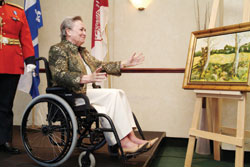Lieutenant Governor encourages QAAL

Lieutenant-Governor Lise Thibeault was presented with a landscape by Westmount painter Dan Delaney on behalf of QAAL. At the reception, entertainment was provided by singer Lisa Walsh, one of the star participants in Concordia’s Centre for the Arts in Human Development.
Photo by kate hutchinson
The Quebec Association for Adult Learning celebrated its 25th anniversary with a family party at which the tone was set by the nurturing presence of Lise Thibault.
“Life is a gift,” she told the audience softly. “Teaching is giving, and transmitting hope. QAAL has shown the capacity to listen, and translate ideas into action.”
Despite the formal presence of a red-coated escort from the Mounted Police and an aide to handle her wheelchair, Thibault projected the radiant idealism that makes her the community organization’s ideal honorary patron. She delighted her audience by announcing that she would stay on as lieutenant governor for another four years.
Thibault was herself an adult educator. She also founded the influential group Femmes d’aujourdhui, hosted programs on the Télé-Métropole and Radio-Canada television networks. Before becoming the Crown’s representative in Quebec, she held a succession of public posts, including president of the Quebec Bureau for the Handicapped.
QAAL has been based in the Adult Education offices of Concordia’s Department of Education since 1985, when the program was situated on the Loyola Campus. The group has close links with the university through several of its prominent members, including Education professor Arpi Hamalian, and Applied Human Sciences professor Randy Swedburg, who got QAAL’s first honorary membership.
Riva Heft was a founding member of QAAL. She taught in the Education Department and was director of Adult Education when it was a separate program. She has just written a history of QAAL, and it was available for sale at the May 8 anniversary party. It tells how QAAL grew out of the peculiar challenges of being a minority within a minority.
The 1970s and early 1980s was a period of turmoil, especially in Quebec. The French Language Charter, the entry of many women into the labor market, the need for new skills, severe budget compression, and a government report that favoured basic literacy and job training over other kinds of learning — all pointed to the need for a support organization for English-speaking Quebecers.
QAAL’s early years were devoted to outreach and advocacy, but as time went on, the organization also embraced distance education and began to undertake its own research and conferences. Adult education became more deeply entrenched in the general education system, and in 2002, the Quebec government adopted a policy on lifelong learning, which QAAL had always embraced.
Heft thinks QAAL still has work to do. Quebec’s high-school dropout rate continues to be high, and it’s difficult for adults outside the city to find appropriate courses. She says the next challenge is to make French-speakers bilingual so they can compete in the global economy.
More information about QAAL is at doe.concordia.ca/qaal/
